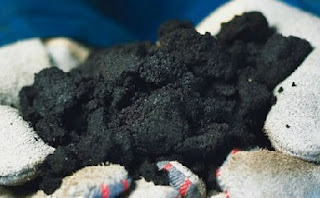 |
| tar sand |
Jason's ignorance of his topic shone brightly throughout the piece, beginning with the first sentence:
"Oil sands are a mixture made from sand and an organic liquid known as bitumen."
Here, we point out that oil sands aren't "made from" that mixture, which sounds like dwarfs are pouring sand and bitumen into huge underground vats; not to mention that Chavis sure sold bitumen short. Not only is calling bitumen a "liquid" generous, he missed a golden opportunity to point out that this "organic liquid" is one form of crude oil. Duh.
Jason cunningly reworded further chunks of content on the American Geosciences Institute website, including multiple clumsy attempts to interpret content he clearly did not comprehend. We're talking about statements such as,
- "Crude oil generally will flow out of the ground under its own pressure; however, oil sands do not contain the same pressure and viscosity..." – Liquids do not "contain pressure and viscosity," viscosity is a physical property of a liquid and pressure is an external variable. Sheesh.
- "[A] common practice for oil sand extraction is... a process known as in situ, which heats up the oil sands using steam or hot air." – We guess Jason flunked Latin, because "in situ" simply means "in place." The in situ process to which Jason alludes is known as steam flooding, in which steam is injected into a subsurface oil sand reservoir to reduce the viscosity of the bitumen so it will flow to a recovery well.
- "Additionally, a method of hydroprocessing must be used to purify the petroleum before it is sent to the refinery." – In fact, hydroprocessing is a step in the refinement process, in which contaminants are removed from the bitumen.
The remainder of Chavis' post is boilerplate reworded from somewhere (probably Wikipedia) and contains only minor misrepresentation. A final, critical misinterpretation we could not definitively blame on Chavis is the statement that,
"Other areas, such as the United States... also have vast reserves of oil sands."
The Wikipedia article from which Jason cribbed this factoid points to the Unita and Green River Basins of the intermountain west; where there are no oil sands, which by definition contain degraded hydrocarbons in the form of bitumen. The "oil shales" of Utah, Colorado, and Wyoming are not bitumen-rich; instead they are kerogen-rich, meaning that they contain a form of hydrocarbon that is immature and cannot (yet) be refined into usable hydrocarbons.
All of which suggests that our Dumbass of the Day would not know an oil sand if he tripped over one... and that the people who think he would know one have been misled.
SI - OIL
No comments:
Post a Comment